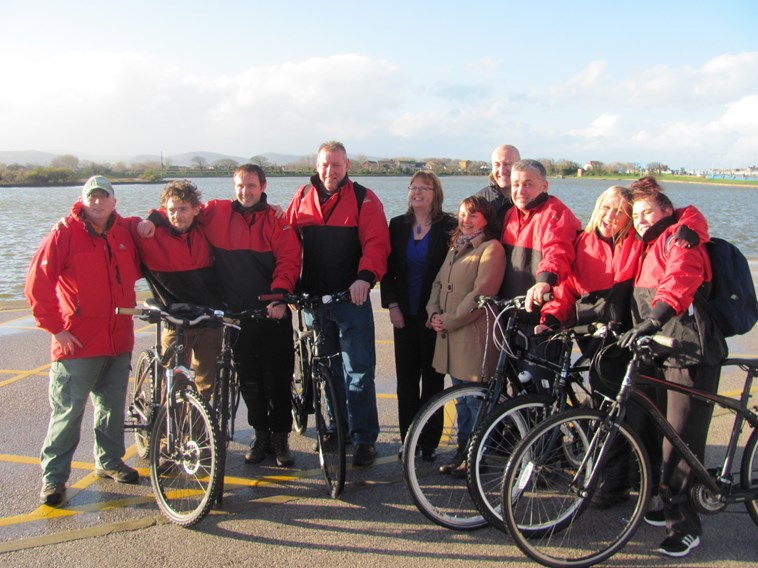Group Size
?
1.) Small group (teams of 4-6)
2.) Individual Task
3.) Large Group
4.) Any
Any
Learning Environment
?
1.) Lecture Theatre
2.) Presentation Space
3.) Carousel Tables (small working group)
4.) Any
5.) Outside
6.) Special
Outside
QAA Enterprise Theme(s)
?
1.) Creativity and Innovation
2.) Opportunity recognition, creation and evaluation
3.) Decision making supported by critical analysis and judgement
4.) Implementation of ideas through leadership and management
5.) Reflection and Action
6.) Interpersonal Skills
7.) Communication and Strategy
4Implementation of ideas through leadership and management
5Reflection and Action
7Communication and Strategy
This 4 day programme took a self-led journey of discovery in the great outdoors, with the design of the course giving time to reflect between tasks and activities. This dynamic concept was transformational complimenting the standard (Kolb) cycle of learning (see references).
The programme had a focus on leadership, communication, problem solving skills and teamwork: all higher education driven employability skills. It supported a mixed group of students and service users of an addiction rehabilitation service, working together to support their own development and build skills.
It was a collaboration between Glyndwr University Careers, ARCH Initiatives and Active Adventure. The project group included service users and HE students working collaboratively, alongside support staff from all of the 3 partner organisations.
Experiencing the outdoors can be a powerful stimulus for learning. Being deep in a forest, feeling alone on a hillside or just sharing a cup of tea around a fire can set us off on a path that changes the way we think about ourselves, our relationships and way we live our lives.
Being outdoors unlocks a rich collection of stories and concepts to explore.
Through this project individuals were able to reflect and make changes – often over a long period of time. Some participants were helped by others to make sense of something and appreciate it.
The project looked at being outdoors as an educational experience, exploring questions including;
Day 1: Mountain Biking and a Raft build (Teamwork-Leadership-Communication) based on the Marine Lake at Rhyl in North Wales.
Day 2: Quality Mountain Day with a team task (Teamwork-Leadership-Communication) located within the mountains of North Wales.
Day 3-4: Team Development Course (Residential) – The final exercise, within bunk house accommodation, concluding with a final presentation which involved participants delivering their own learning log to the rest of the group, reflecting on the physical and mental journey they had taken over the duration of the course.

Figure 1: The group enjoying their activities
The impact was significant as outdoor learning brings people into a direct relationship with the ‘elements’ – earth, air, water and fire and strips away many of the means we have developed to ‘protect’ ourselves from their impact. Making do with what’s around and having an experience that’s not catered, comfy and plain sailing, with things that are not planned (but safe!) helps/forces us to try something that’s scary: for example, night games in dark fields with no torches!
As such outdoor learning throws people back on their own resources, and allows them to connect with the world in a different way. It often entails challenging situations where the unexpected can happen and where different responses are demanded.
People find incredible strength, confidence and self-determination through operating in the outdoors, pushing the boundaries both physically and culturally. Clients have been encouraged to gain the Mountain Leader’s Award, and are able to take others climbing with confidence and transfer positivity onto other young people.
Outdoor learning is often demanding in terms of our bodies: we have to learn new skills and carry on when we would rather stop. In my experience it pushes people to the edge of their comfort zone, throwing them in the deep-end to deepen their learning.
This project is maintaining a long term perspective as changes often take time to surface or to become embedded. People need space to talk and think about their experiences and opportunities to try things out with consistent support over time.
That is why we are using the MTQ48 measure so we can map outcomes over a period of time (see references).
Learner outcomes have been measured by using the MTQ48 resilience measure at the beginning of the 4 day programme and again at the end of the project.
A distance travelled report is generated and trained counsellors support participants to reflect upon the findings and develop action plans to move forward.
Each participant also completes an Employability Skill Audit which allows the participants to reflect upon achievement made and new skills gathered whilst exploring further development required where gaps are identified.